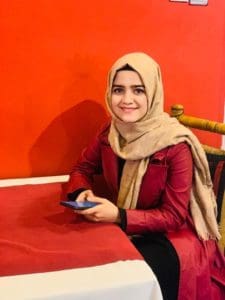Inspiring a New Generation of Leaders. Member Spotlight: Farida Razaqi
Farida Razaqi is a Master of Laws student and Fulbright Scholar at the State University of New York- University at Buffalo- School of Law studying Environmental and Natural Resources Law. She is also a Student Attorney with the Environmental Advocacy Clinic. Prior to this, she served as a Legal Expert at the Afghanistan Legal Research and Development Organization, leading the “Strengthening Afghan Women Judges Association Project” in Partnering with Max Planck Foundation for International Peace and Rule of Law in Kabul. She also served as Lecturer at Herat and Jami Universities in Herat. As part of her professional career, she worked as a regional coordinator with Afghans for Progressive Thinking, a youth-led organization working for peacebuilding in Afghanistan. Farida completed her Bachelor’s degree in Law and political science at Herat University
A newer MBBI member, Farida, has enjoyed meeting others in the MBBI network and is most interested in the working groups for gender equality and climate action. She admits that when she first heard about MBBI from a colleague, she was afraid that she wouldn’t be able to contribute her skills and experience since she wasn’t a trained mediator. However, she quickly realized that there was a large variety of topics on which MBBI members engaged. “Every person can find a spot for him or her, and I found a place where I can use my own specialization and expertise.”
Watch this powerful video on the current situation of Afghanistan that several MBBI members created.
A Passion for Environmental Law

Farida began pursuing her education in Law due to the water conflict she witnessed firsthand in Afghanistan. There were cross-border disputes over water management with Iran, as well as farmers who were at a disadvantage without a proper water allocation system in place. Inspired to improve regulations around water in her community, she decided to focus her career on environmental Law and diplomacy in order to learn how to manage negotiations around natural resources.
After she graduated with her Bachelor’s degree, Farida was invited by Herat University to teach an environmental law course. “These climate change issues are very new for people in Afghanistan. Students can’t think about it because we have many other problems to take care of, so it isn’t everyone’s priority.” She describes the mentality of many of her students had when they first sat down in her classroom. “They asked me, why are you teaching us environmental Law? ‘This should be in the agriculture department.’ I was shocked. They don’t know that there’s something dangerous happening with the Earth.”
“We can’t waste even one second.”
When asked about her thoughts on climate action in the context of Afghanistan today, Farida remains optimistic. Like many Afghans, she and her family faced immense security challenges when the Taliban took control of the country in August 2021. Despite this, she is still hopeful and actively working towards her goals of engaging in hydro politics in Afghanistan. She explains, “There are a lot of things to be disappointed and sad about, country problems and personal problems, but there is still hope. I think having dreams will inspire you to move forward. An easy life won’t give much inspiration, but sometimes, pain and problems can be catalysts.” She adds that, especially for making progress on climate change-related issues, we can’t waste even one second. In Afghanistan, climate change-related water insecurity greatly impacted Afghans’ livelihood strategies, and many turned to the Taliban for economic security. “If they don’t have water for agriculture, then there is no way to survive, and so they are joining these groups. The Taliban benefited from climate change and the water conflicts, even though they didn’t know anything about it.”
A Trail-Blazer
Farida is most proud of her work as a trail-blazer, specifically in challenging gender norms in the higher education and professional realms in the Middle East. She recalls her experiences in Student Council at her law school in Afghanistan. Though it was a mixed gender school, there were still cultural norms that made it uncommon for men and women to communicate frequently. “Students were not interested in attending extracurricular activities. I remember the first time I organized a discussion session, no one came!” She explained how male students started to attend the programs after she invited students one by one, but still, the girl refused to come. According to her, girls had a hard time showcasing their abilities and voicing their opinion due to the impact of the environment that they grew up in and the cultural limitations. But Farida was persistent in convincing them to break the taboos and raise. “I was the only girl participating at the beginning with more than 50 boys. But over time, students who wouldn’t dare to participate were suddenly leading events. This is one thing I’m really proud of.”
She describes a parallel situation during a job interview she had for a program in Kazakhstan in the mining sector. “They asked me, how do you want to work in this sector as a woman from Afghanistan? And I said, maybe I’m the first person coming to this role, but at least I’m opening the door for others who will follow and be more successful than I. I want to be the first person to break the taboo and be an inspiration for others.”
Farida hopes to continue inspiring others to be better people and believes that that is truly what defines a leader. “When you are a leader, you should inspire others to bring change. That change shouldn’t end with you, but instead, be a legacy that continues.”
Article by Chloe Pan, MBBI Writer
